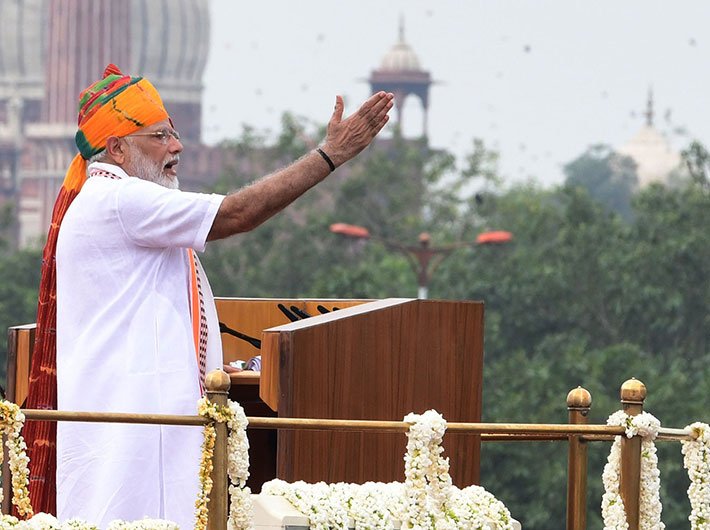From small to big, he touched upon a range of issues aimed at ‘ease of living’ for citizens
Contrast prime minister Narendra Modi’s first Independence Day speech in 2014 with his latest, the first in the second term, and you know the difference. His first speech was less about future and much about the basic needs like Swachch Bharat (clean India). His speech on Thursday, on the other hand, set the agenda for an aspirational India for the next five years.
The sheer range of the nearly 95-minute speech was so expansive that the every word he seemed to have a purpose. Take for the example the manner in which he invoked Mahatma Gandhi's insistence on austerity in public life and in the same breath exhorted people to aspire for a 5 trillion dollar economy. He found no contradiction in Gandhi's austerity and the average Indian acquiring economic muscle.
Except for the first ten-odd minutes when he spoke of the politics of Article 370, Modi seemed to be assiduously setting the agenda for the future. Quite clearly he aligned his politics with the average citizens and sought their support to fulfil certain dreams. Far from being coy about the abrogation of Articles 370 and 35A and division of Jammu and Kashmir, he threw gauntlets at his opponents by asking “Why, if Article 370 was so good for the country, did they not make a permanent feature in the Constitution in the past 70 years?” His conversation with the audience found traction.
But the fact that his mission has only begun was evident when he referred to the threat of population explosion. The moment he mentioned the issue, the audience applauded. Sanjay Gandhi's forced sterilisation campaign during the Emergency days had become such a taboo that no political party or leader dared to reopen the debate. No political party since 1975 ever dared take up this issue for public debate. Modi cautiously but deftly flagged it as a national priority in the speech.
There will be an attempt to look at the issue from the prism of communalism. But that will certainly be the wrong interpretation. The increased fertility rate of certain backward regions of the country has become a huge drag on growth. Modi's reference to population explosion was in that context. But he is quite conscious of the fact that fundamentalists will tend to distort it to exploit religious sentiment. This is why he interspersed his speech with several references to "mothers, sisters and daughters" among Muslims who feel empowered after the legislation against "triple talaq". "When we can abolish Sati, legislate against dowry and child marriage, why can't we bring law against triple talaq?" he had asked earlier explaining the legislative logic behind the law.
US president Ronal Reagan had said in the eighties that the most terrifying words in English were "I'm from the government and I'm here to help." Modi echoed this sentiment when he pointed out that the government should withdraw from people's life. Perhaps realising that the intrusion of government in people's life has diluted his message of "minimum government maximum governance", Modi promised to let the government play the role of an enabler not disruptor in people's life. Coming from the prime minister on the Independence Day, this message conveyed his determination to usher in radical administrative reforms.
That he is determined to take his Swachch Bharat agenda to a logical end became evident when the prime minister announced the launch a social awareness campaign against single-use plastic materials. While urging people to join the campaign to ban plastic completely, he pointed out a business opportunity for startups to recycle this waste in an efficient manner. Realising that the country's burgeoning middle class is the biggest consumer of plastic, he sensitised them of its dangers for the future of the Earth. This social message was effectively delivered in a political occasion. Exhortations to farmers to reduce use of fertilisers, Indian tourists to visit 15 locations in India before 2022 and many other such initiatives that etch the citizen's role in the making of the nation were strewn all over his speech.
In the midst of economic and political messaging, the prime minister has not lost the sight of strategic issues as revealed by the institutionalisation of the post of chief of defence staff (CDS) to oversee coordination and modernisation of the army, the air force and the navy – a long-standing demand. The necessity for this post was emphasised in the K Subramaniam committee report after the Kargil war in 1999. But the issue was never attended to because of the bureaucratic resistance in the defence ministry. The move is clearly aimed at streamlining and modernising the defence forces in tune with the developed nations and neighbouring China.
A string of announcements on huge public investments for building rural roads, medical colleges, creating infrastructure for transport at an unprecedented scale is an indication of the government's determination not to bank solely on private investment to speed up the economy. Aware of the slowing down of the economy, Modi's announcements on taking up developmental projects seem to be intended to square up for lack of private investment in the country. In his long address, he efficiently drew the picture of optimism for the future and delineated the path the government intends to traverse. For those who cared to listened to his speech Narendra Modi laid bare his agenda. It's all out there in the open.
(This comment has appeared on FirstPost.com)

